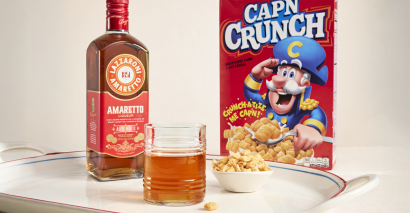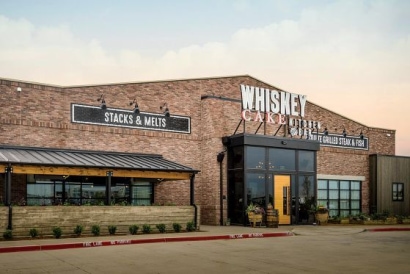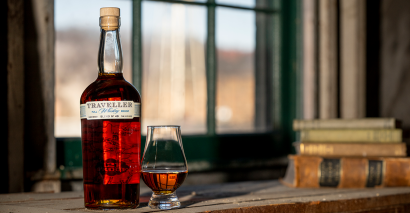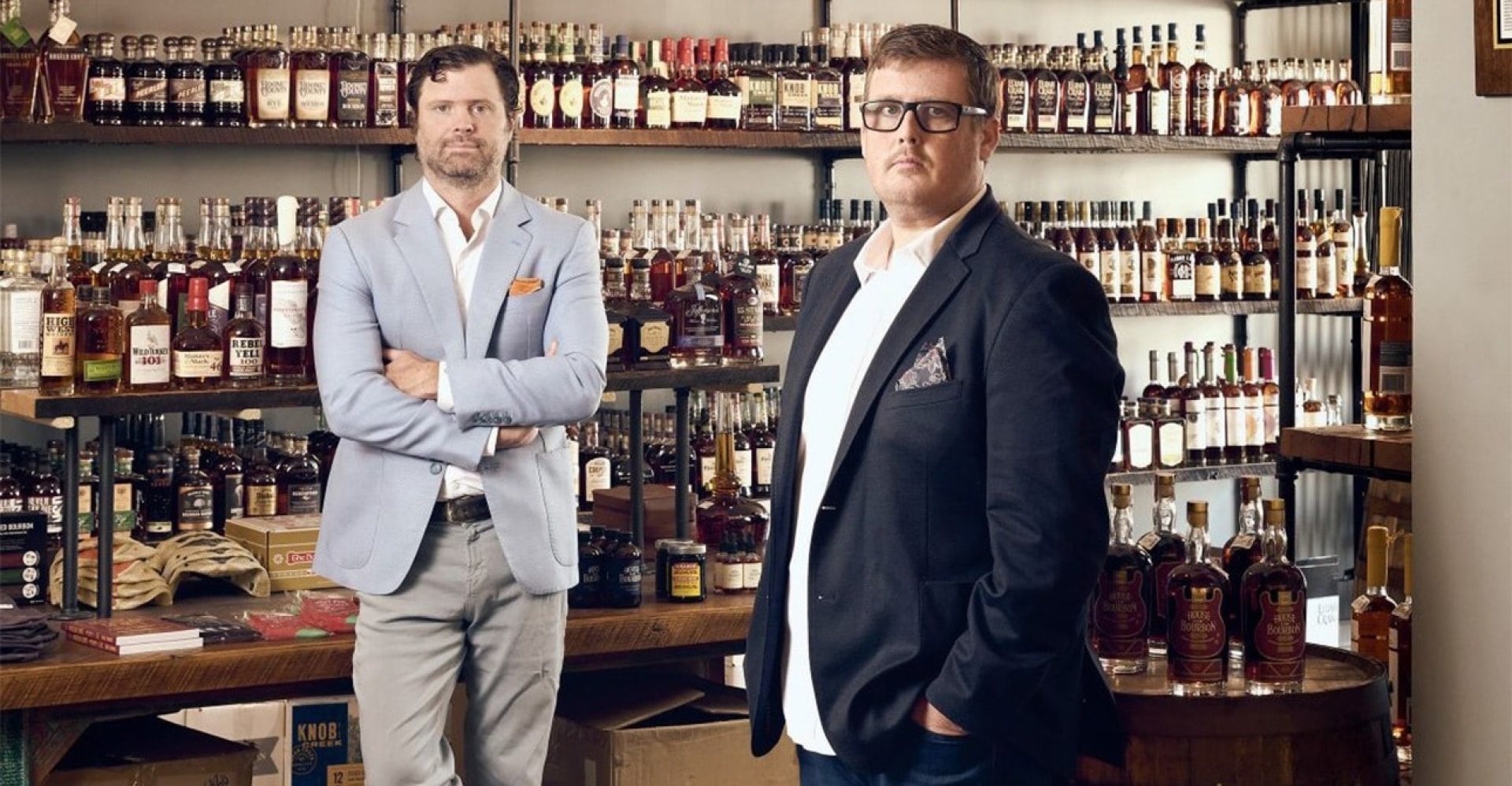
Justin Thompson (left) and Justin Sloan opened Justins’ House of Bourbon in 2018 to sell vintage spirits, following the passage of the Kentucky Vintage Spirits Law. They have since become enmeshed in a legal tangle that reveals the weaknesses and ambiguities in the law. DANNY ALEXANDER
In January 2018, the Kentucky Vintage Spirits Law was enacted. The law’s aim is to allow bars, restaurants, and liquor stores to sell vintage spirits without using a distributor. Alcohol in the U.S. normally must be sold through what’s called the three-tier system—starting with a producer, who sells to a distributor, who then sells to a retailer. But now Kentucky’s licensed retailers (including bars and restaurants) can buy old bottles from ordinary citizens and sell them in their establishments. Among other advantages for whiskey lovers, it provides an outlet to those who previously had to seek out “old dusty” vintage whiskeys on the illegal secondary markets that flourish on Facebook.
However, some ambiguous wording in the law created multiple problems over the past six years. Numerous sources we spoke to shared stories of state liquor enforcement agents misunderstanding the law, leading to confiscations of products and fines. Here are some of the major milestones in the Kentucky Vintage Spirits Law.

JUNE 2017
The Kentucky Vintage Spirits Law, or House Bill 100, is passed in the state legislature. The law allows vintage spirits to be bought and sold outside of traditional methods. A key definition from the law states that a “‘Vintage distilled spirit’ means a package or packages of distilled spirits that: are in their original manufacturer’s unopened container; not being sold by a distiller; and are not otherwise available for purchase from a licensed wholesaler within the Commonwealth (of Kentucky).”
2018-2021
Stores focused on selling vintage whiskey start to open. Justins’ House of Bourbon launches in 2018, with owners Justin Sloan and Justin Thompson offering vast personal collections of dusty bourbon to sell in their Lexington and Louisville locations (Justins’ also has a Washington D.C. outpost called Bourbon Outfitter, which ships nationally). Two years later, Brad Bonds and Shannon Smith open Revival Vintage Spirits & Bottle Shop in Covington, Kentucky.
Then in 2021, Owen Powell opens Neat Bourbon Bar and Bottle Shop in Louisville.
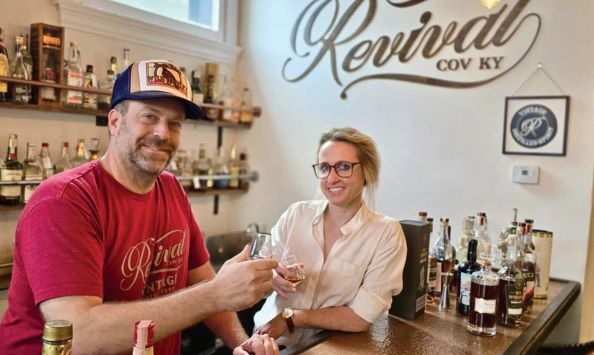
Immediately, there is confusion about what bottles are considered vintage. “As the law states, if it’s not available from the distributor, it’s considered vintage,” says Powell. If a licensed shop or establishment can’t get an allocation of Blanton’s or Weller from Buffalo Trace, then the establishment could buy it from a customer. Even if that bottle was made the same year it is being sold to the establishment.
“My lawyer said if I contact a distributor to ask for all the bottles I want, and the distributor replies that some are not available, then it’s legally okay to buy [those unavailable bottles] as vintage,” says Powell. In addition, all single barrel selections are considered vintage, since those aren’t equally available through an establishment’s distributor. Powell recounts multiple instances of having to pull out the law— which he keeps taped inside a binder of all his recorded vintage purchases— and showing it to ABC agents who come into Neat for spot checks. “I sometimes have to explain why I’m allowed to sell certain bottles to these ABC agents,” Powell says.
Vintage bottle purchases must be reported to the Kentucky Alcoholic Beverage Control (ABC) agency, and bear a sticker on the bottle that declares them to be a vintage spirits product.
Authentication is left to the discretion of the establishment that buys the spirits. “I look at every bottle like it’s fake,” says Bonds. “No receipt? I need to see your bank statement showing me you got it from a retailer. If the tax strip looks brand new and everything else on the bottle is beat up, something is off.” Bonds recalls one woman who brought in a 1950s Old Forester that she won at a charity event. “The strip was ripped and the liquid looked light when compared to another real bottle I had from the same era. She had won a refilled bottle, and I didn’t buy it,” Bonds says.
While some vintage bottles—from pre-Prohibition through the 1990s—are sold, the majority of bottles bought under the vintage law are cases of Weller, Blanton’s, and Pappy Van Winkle. Records obtained by the Lexington Herald-Leader show that one individual sold five cases of Weller Special Reserve, a case of Weller Antique 107, and a half-case of Weller Full Proof in May of 2021 to a single store in a single visit. That same seller came back a month later and sold four additional cases of Weller Special Reserve. The newspaper notes some sellers moving as many as 600 bottles of currently available Buffalo Trace products within a six-month window.
JANUARY 2023
Acting on an anonymous tip submitted to the Kentucky ABC, Justins’ House of Bourbon is raided by enforcement agents in Kentucky and Washington D.C. for violations, namely buying bottles that didn’t meet the law’s standards, improperly shipping bottles across state lines, failure to properly label bottles as vintage, and failure to report bottles purchased. Hundreds of bottles were seized, and claims within the case files mention that government officials were talking with Sazerac, owner of Buffalo Trace, which suggests some seized Blanton’s bottles may be counterfeit.
MAY 2023
None of the bottles seized from Justins’ House of Bourbon are found to be counterfeit—the Blanton’s bottles simply had slightly different labeling because they were destined for European markets. “I’ve been doing this a long time and I had never seen markings on bottles like that,” says Justin Peru, an investigator with D.C.’s Alcoholic Beverage and Cannabis Administration, who was present at the raid. “We later learned this is how [Blanton’s] is marked for the European market,” Peru says. He adds that Justins’ bottles were traced back to Sazerac, that Justins’ filed importation permits and paid all taxes and fees, so the bulk of the “charges on our end were dismissed.” Justins’ admits failing to maintain records and failure to furnish documents to investigators within 48 hours. A $3,000 fine is paid and Justins’ is allowed to continue to operate in D.C. Kentucky ABC hasn’t filed any charges, though it also refuses to release the seized inventory. (A representative for the Kentucky ABC declined to comment for this story.)
JUNE 2023
The Kentucky ABC allegedly tracks vintage sales, although the state couldn’t furnish a database of those sales when asked by the Lexington Herald-Leader, so the newspaper creates one based on state-provided records. It finds that 50 licensed establishments reported more than 1,150 purchases between January 2018 and March 2023. More than 14,000 bottles were purchased, most of which were bottles currently being produced. With 2,000 bottles of Blanton’s and 2,400 bottles of Weller reported, those two brands represent more than 30% of all vintage bottle sales to vintage spirits retailers.
After reading that report, then-CEO of Sazerac Mark Brown issues a statement to the newspaper that he wants lawmakers to “review the law and modify the law to permit only pre-metric era (1980) bottles thereby reinforcing the original concept and intent,” adding he feels the law “has become a channel for secondary market, smuggled, and counterfeit goods rather than its well-intentioned original purpose— to surface and make available very old and unique bottles of spirits.”
JULY 2023
After months of inaction by the Kentucky ABC, Justins’ files a lawsuit against them saying the bottles were improperly seized, and seeking the courts to legally deem rare bottles as protected under the vintage spirits law. After learning that the seized bottles were damaged by a water leak in the ABC facility, the judge orders the 640 bottles (worth an estimated $2.5 million) released back to Justins’, though until the case resolves, Justins’ is prohibited from opening or selling any of the bottles.
AUGUST 2023
The Kentucky ABC starts legal action against Doc Crow’s Southern Smokehouse & Raw Bar in Louisville, citing that Doc Crow’s had not reported all vintage bottle purchases, failed to properly sticker vintage bottles, and bought “multiple distilled spirits that are not vintage [but] rather just hard to find” The ABC also finally charges Justins’ with nine administrative violations, seeking to revoke or suspend Justins’ liquor license, though no criminal charges are filed.
FEBRUARY 2024
Justins’ files a motion asking to remove the ban from selling their products, claiming the slow-moving Kentucky ABC’s process is “an exercise in futility,” plagued by biased administrators. Denying that motion, the judge does order the ABC to expedite the matter. That claim of bias by Justins’ arises in court later in February when Shawn Chapman, executive director of the Public Protection Cabinet (the ABC’s parent agency) and the person responsible for adjudication of Justins’ case, has to recuse himself due to owning a large collection of vintage bourbon. Meanwhile, Doc Crow’s settles with the ABC, admitting violations occurred and paying $5,000 in fines to continue to operate.
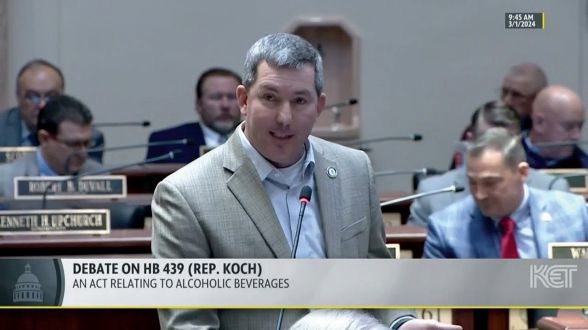
House Bill 439 is presented to state lawmakers by Rep. Matt Koch, who claims the original law allowed for “an unregulated fourth tier in the alcohol industry.” This bill has a number of elements to tighten loopholes. The new bill makes it a crime for one customer to sell more than 24 bottles to a store in a year, or for a store to buy more than 24 bottles in a year from one customer. The first offense is a misdemeanor, with the potential for a year in jail; subsequent offenses bump up to felony territory, bringing as many as five years in jail per incident. Stores are also required to buy a separate $300 vintage distilled spirits retailer license and issue monthly buying reports to the ABC. It addresses the protracted proceedings time of the Justins’ case, stating that notices of violations must be brought within 14 days of seizing bottles, or the bottles must be returned to the establishment. And the state has the ability to auction off seized bottles, with proceeds going to alcohol education and responsibility programs. The bill passes and is signed into law in April.
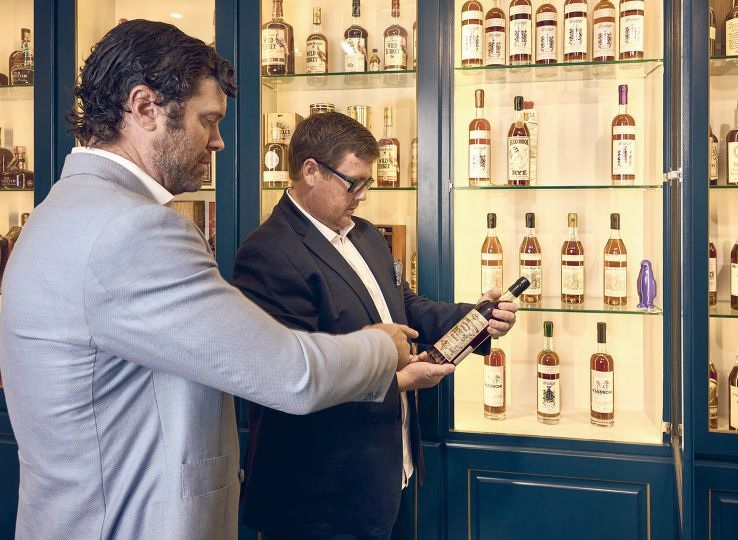
MAY 2024
Ahead of the Kentucky Derby, Justins’ files for an emergency restraining order, asking the court to lift the ban on vintage sales for the store, claiming it will go out of business without it. Justins’ filed for the additional retail license required under the new legislation, but the ABC refused to grant it due to the ongoing case. The judge sides with Justins’, allowing them to return to selling. (However, the 640 seized bottles are still considered evidence and not allowed to be sold.) The ruling also prohibits the ABC from taking additional action against Justins’ until the case is resolved.
Retailers believe there’s a further opportunity for clarity from the ABC and the law. “The wholesaler side of things needs to be fleshed out more,” says Smith, who is also an alcohol regulation attorney. (Smith represented Doc Crow’s during its legal strife.) “Take estate sale companies; early on they could sell [vintage alcohol] collections to us, now they cannot. If large collections can’t be sold due to the 24-bottle limit, we’re losing a lot of product and the state is losing taxpayer dollars. There should be some exemption to the 24-bottle limit,” she says.


